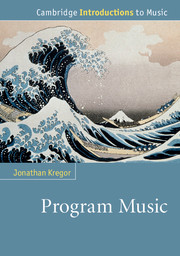Book contents
- Frontmatter
- Contents
- List of Figures
- List of Music examples
- List of Tables
- Acknowledgments
- Note on the text
- Introduction
- Chapter 1 Characters, topics, and the programmatic battlefield
- Chapter 2 Expression, musical painting, and the concert overture
- Chapter 3 Berlioz and Schumann on music and literature
- Chapter 4 Liszt and the symphonic poem
- Chapter 5 The New German School and beyond
- Chapter 6 Excursus: Faust
- Chapter 7 Programmatic paths around the fin de siècle: Mahler and Strauss
- Chapter 8 Programming the nation
- Chapter 9 “Ars Gallica”
- Notes
- Guide to further reading
- Index
Chapter 6 - Excursus: Faust
Published online by Cambridge University Press: 05 January 2015
- Frontmatter
- Contents
- List of Figures
- List of Music examples
- List of Tables
- Acknowledgments
- Note on the text
- Introduction
- Chapter 1 Characters, topics, and the programmatic battlefield
- Chapter 2 Expression, musical painting, and the concert overture
- Chapter 3 Berlioz and Schumann on music and literature
- Chapter 4 Liszt and the symphonic poem
- Chapter 5 The New German School and beyond
- Chapter 6 Excursus: Faust
- Chapter 7 Programmatic paths around the fin de siècle: Mahler and Strauss
- Chapter 8 Programming the nation
- Chapter 9 “Ars Gallica”
- Notes
- Guide to further reading
- Index
Summary
As the surrounding chapters chronicle, Homer, Ovid, William Shakespeare, Lord Byron, and dozens of other writers produced hundreds, probably thousands, of works of literature that enjoyed second lives in music during the common practice period. However, arguably no single literary work has attracted a greater number of musicians than Johann Wolfgang von Goethe’s closet drama Faust. While it has inspired several operatic adaptations since its publication in the early nineteenth century, along with numerous scores of incidental music written to accompany the play, Faust is notable for its manifold transformations – in whole or part – into overtures, symphonies, symphonic poems, sonatas, ballets, cantatas, choruses, and solo songs by composers as stylistically diverse and chronologically separate as Franz Schubert, Hector Berlioz, Robert Schumann, Franz Liszt, Charles-Valentin Alkan, Gustav Mahler, Ferruccio Busoni, Lili Boulanger, Igor Stravinsky, and Alfred Schnittke. Moreover, in attempting to assimilate and occasionally depart from Goethe’s complex stage drama and other elements of the Faustian legend, many of these composers also expanded the limits of music’s programmatic potential. This chapter identifies common strands and divergent paths taken in that pursuit.
Goethe’s Faust: origins, themes, legacy
Goethe did not invent the tale of Faust, but rather drew upon a corpus of Faustian stories and legends – some of which went back more than two centuries – that had long since become part of German and, to a lesser extent, European folklore. In fact, the crux of Goethe’s play can be traced back to the anonymous Historia von D. Johann Fausten, published by Johann Spies at Frankfurt am Main in 1587. Here the brilliant physician and theologian Doctor Faustus, motivated by a “godless and reckless resolve,” enters into a pact with a devil named Mephistopheles. In exchange for his soul, Faustus receives twenty-four years of limitless abilities, allowing him to accumulate (forbidden) knowledge, wealth, success, and companionship. Toward the end of the book, with his life almost at an end, Faustus attempts reconciliation with God but fails. At the appointed hour, a tempest descends on his locked chambers. The next day, friends and students find Faustus’s still twitching mangled corpse strewn across a dung heap outside.
- Type
- Chapter
- Information
- Program Music , pp. 161 - 194Publisher: Cambridge University PressPrint publication year: 2015

